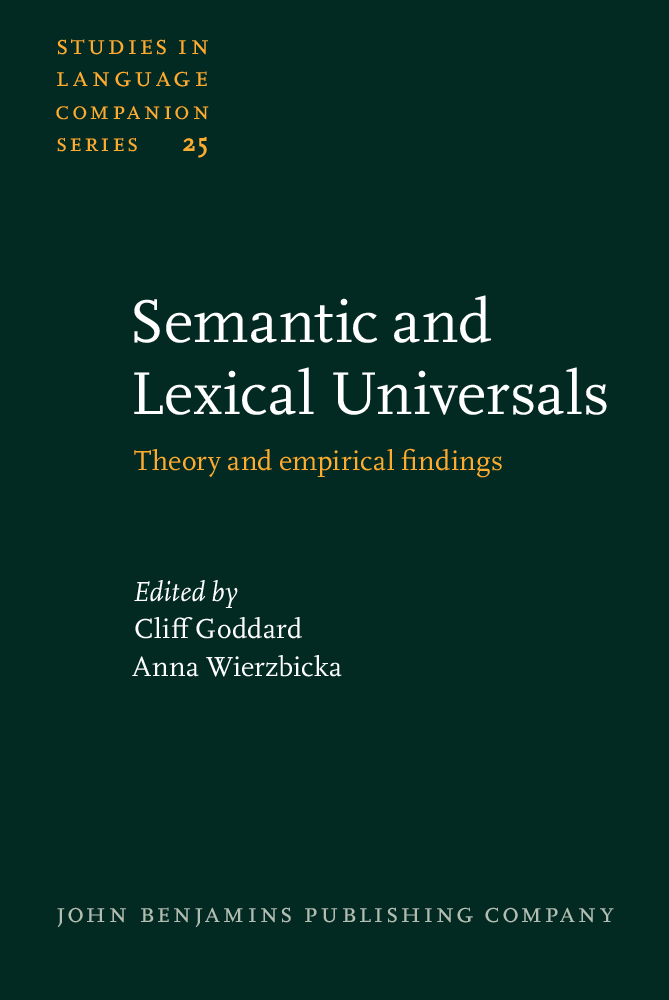- 丛书名 : Studies in Language Companion Series
- 中图分类号: H0
- 语种: ENG
- 出版信息: John Benjamins Publishing Company 1994 522页
- EISBN: 9789027285782
- PISBN-P: 9789027230287
- 原文访问地址:
KG评星
知识图谱评星,是一种基于用户使用的评价体系,综合图书的评论数量、引文数量、Amazon评分以及图谱网络中节点的PageRank值(即考虑相邻节点数量和重要性)等多种因素计算而得出的评价数值。星级越高,推荐值越高。CAT核心级
核心学术资源(CAR)项目作为教图公司推出的一项知识型服务,旨在打造一套科学、有效的图书评价体系,并协助用户制定相应的馆藏建设方案。CAR项目调查和分析12所世界一流大学的藏书数据,以收藏学校的数量确定书目的核心级,核心级越高,代表书目的馆藏价值越高。选取核心级在三级以上,即三校以上共藏的图书作为核心书目(CAT)。This set of papers represents a unique collection; it is the first attempt ever to empirically test a hypothetical set of semantic and lexical universals across a number of genetically and typologically diverse languages. In fact the word 'collection' is not fully appropriate in this case, since the papers report research undertaken specifically for the present volume, and shaped by the same guidelines. They constitute parallel and strictly comparable answers to the same set of questions, coordinated effort with a common aim, and a common methodology.The goal of identifying the universal human concepts found in all languages, is of fundamental importance, both from a theoretical and a practical point of view, since these concepts provide the basis of the “psychic unity of mankind”, underlying the clearly visible diversity of human cultures. They also allow us to better understand that diversity itself, because they provide a common measure, without which no precise and meaningful comparisons are possible at all. A set of truly universal (or even near-universal) concepts can provide us with an invaluable tool for interpreting, and explaining all the culture-specific meanings encoded in the language-and-culture systems of the world. It can also provide us with a tool for explaining meanings across cultures — in education, business, trade, international relations, and so on.The book contains 13 chapters on individual languages including Japanese (by Masayuki Onishi), Chinese (by Hilary Chappel), Thai (by Anthony Diller), Ewe (Africa, by Felix Ameka), Miskitu languages of South America (by Kenneth Hall), Australian Aboriginal languages Aranda, Yankunytjatjara and Kayardild (by Jean Harkins & David Wilkins, Cliff Goddard, and Nicholas Evans), the Austronesian languages Samoan, Longgu, Acehnese and Mangap-Mbula (by Ulrike Mosel, Deborah Hill, Mark Durie and Robert Bugenhagen), the Papuan language Kalam (by Andrew Pawley), and, last but not least French (by Bert Peters).In addition to the chapters on individual languages the book includes three theoretical chapters; “Semantic theory and semantic universals” (by Goddard), “Introducing lexical primitives” (by Goddard and Wierzbicka), and “Semantic primitives across languages: a critical review” (by Wierzbicka).







 京公网安备 11010602104826号
京公网安备 11010602104826号
